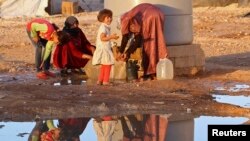UNITED NATIONS —
Having broken its stalemate on Syria with a resolution governing the elimination of Syrian chemical weapons stockpiles, the U.N. Security Council is now working on improving humanitarian access in that war-torn country.
Security Council members Australia and Luxembourg have been working for several weeks on a text concerning humanitarian issues in Syria. Australian Ambassador Gary Quinlan, who was Council president for the month of September, said language was circulated to members on Saturday, and they hope to agree on a presidential statement by Wednesday or Thursday of this week.
“So our ambition quickly now, because we don’t want to lose the momentum and good spirit generated from last Friday, is to get agreement on something which sends a strong, unified message," said Quinlan.
On Friday night, the Council finally overcame more than two years of deadlock on Syria and unanimously agreed to a resolution demanding that the Syrian government complete the elimination of its chemical weapons arsenal by the middle of next year.
On the humanitarian effort, the statement under negotiation seeks to urge Syrian authorities to expedite safe and unhindered access to people in need, including across conflict lines and, when necessary, across borders from neighboring countries.
The Syrian government has only authorized 12 international aid groups to work inside the country. The U.N. says entire suburbs and towns have been deliberately overwhelmed or cut off by fighting. Dozens of checkpoints block main roads between towns and cities, impeding aid delivery to millions in urgent need.
Also Monday, Syria’s Deputy Prime Minister and Minister of Foreign Affairs, Walid Mouallem, spoke at the U.N. General Assembly annual debate. He blamed activities of armed groups in border areas and sanctions imposed by the United States and European Union for worsening living conditions.
He urged all displaced Syrians to return home, saying the government will protect and assist them.
“I would like to assure our readiness to exert all efforts to deliver aid from international organizations to all Syrian citizens without any discrimination wherever they are," said Mouallem.
Mouallem said the situation in the country is the fault of outside terrorist groups and the Arab and Western countries that support them. He said the situation in Syria is not a civil war, but a war on terror.
He added that Syria will abide by its commitments to the Convention on Chemical Weapons, which it recently joined, and will cooperate with the Organization for the Prohibition of Chemical Weapons, which will be overseeing implementation of the declaration and eventual destruction of Syria’s chemical stockpiles.
The U.N. says an advance chemical weapons team will arrive in Syria Tuesday to begin the inspection process.
Security Council members Australia and Luxembourg have been working for several weeks on a text concerning humanitarian issues in Syria. Australian Ambassador Gary Quinlan, who was Council president for the month of September, said language was circulated to members on Saturday, and they hope to agree on a presidential statement by Wednesday or Thursday of this week.
“So our ambition quickly now, because we don’t want to lose the momentum and good spirit generated from last Friday, is to get agreement on something which sends a strong, unified message," said Quinlan.
On Friday night, the Council finally overcame more than two years of deadlock on Syria and unanimously agreed to a resolution demanding that the Syrian government complete the elimination of its chemical weapons arsenal by the middle of next year.
On the humanitarian effort, the statement under negotiation seeks to urge Syrian authorities to expedite safe and unhindered access to people in need, including across conflict lines and, when necessary, across borders from neighboring countries.
The Syrian government has only authorized 12 international aid groups to work inside the country. The U.N. says entire suburbs and towns have been deliberately overwhelmed or cut off by fighting. Dozens of checkpoints block main roads between towns and cities, impeding aid delivery to millions in urgent need.
Also Monday, Syria’s Deputy Prime Minister and Minister of Foreign Affairs, Walid Mouallem, spoke at the U.N. General Assembly annual debate. He blamed activities of armed groups in border areas and sanctions imposed by the United States and European Union for worsening living conditions.
He urged all displaced Syrians to return home, saying the government will protect and assist them.
“I would like to assure our readiness to exert all efforts to deliver aid from international organizations to all Syrian citizens without any discrimination wherever they are," said Mouallem.
Mouallem said the situation in the country is the fault of outside terrorist groups and the Arab and Western countries that support them. He said the situation in Syria is not a civil war, but a war on terror.
He added that Syria will abide by its commitments to the Convention on Chemical Weapons, which it recently joined, and will cooperate with the Organization for the Prohibition of Chemical Weapons, which will be overseeing implementation of the declaration and eventual destruction of Syria’s chemical stockpiles.
The U.N. says an advance chemical weapons team will arrive in Syria Tuesday to begin the inspection process.




